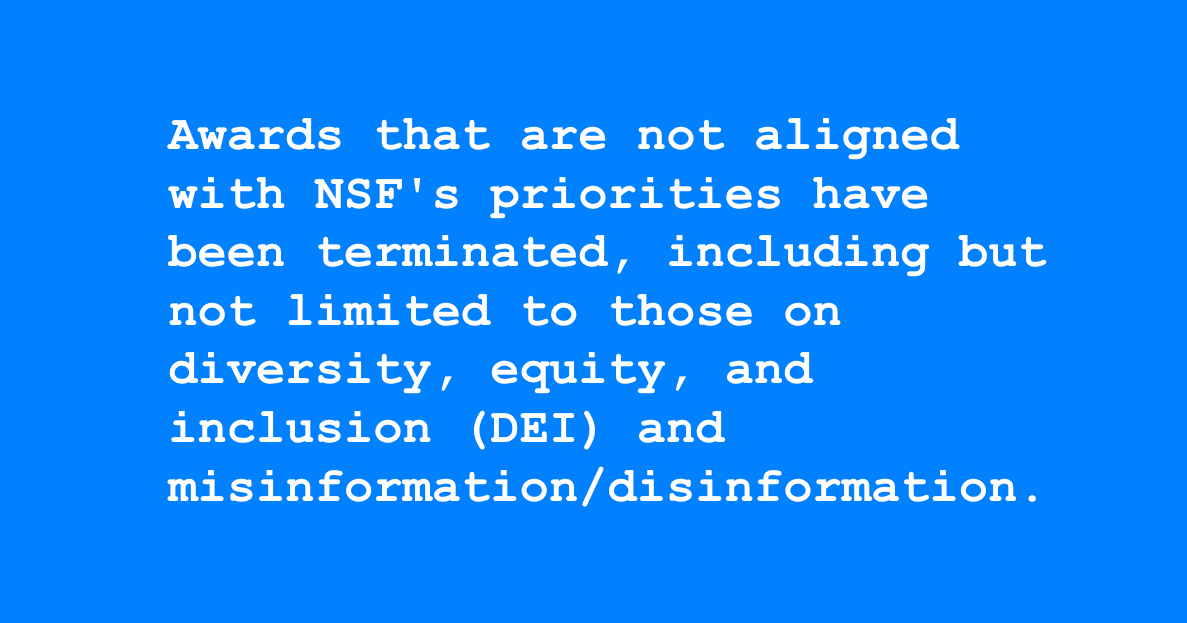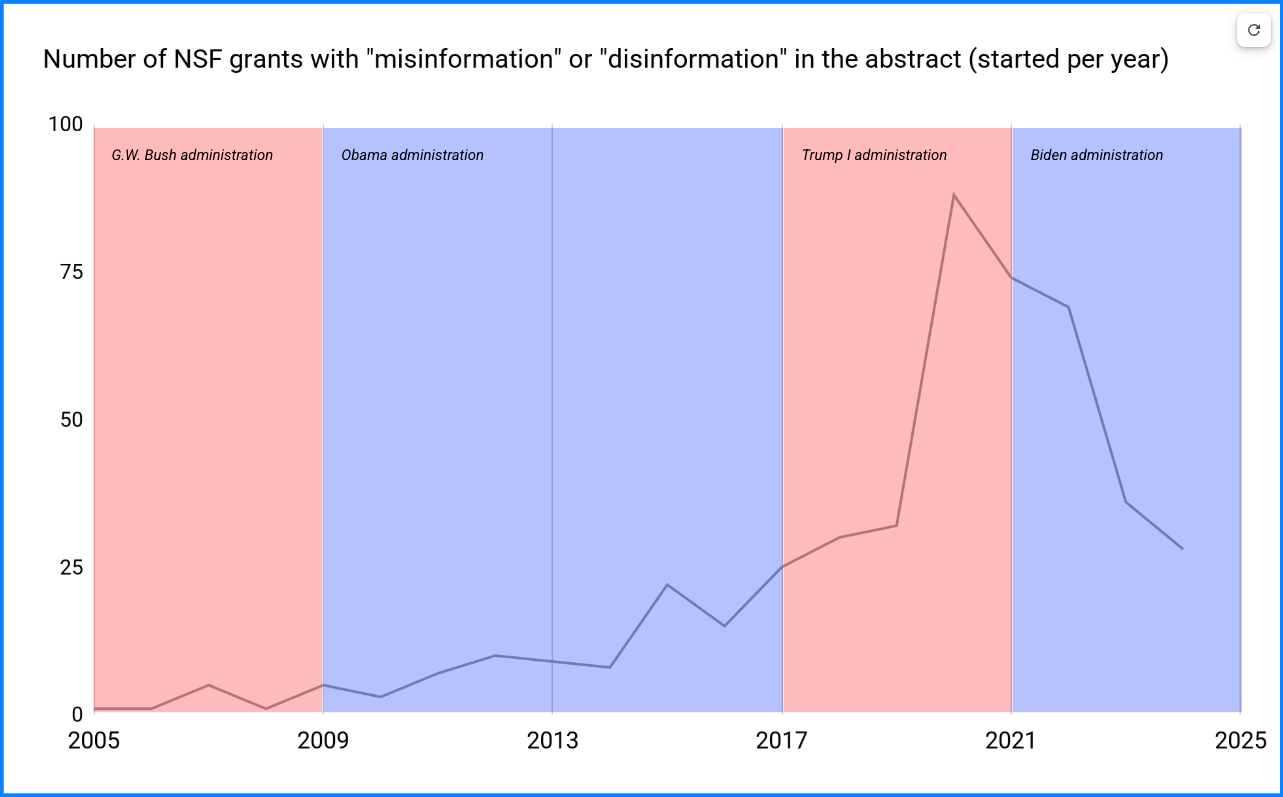NSF takes Ignorance is Strength approach to misinformation research

🤥 Faked Up #45: U.S. National Science Foundation cut millions of dollars in funding for public interest research in the name of "free speech"
This newsletter is a ~7 minute read and contains 41 links.
BRIEFLY NOTED
- A Canadian fake news page is getting more engagement on Facebook than the frontrunner in next week's election.
- A Columbia student suspended for creating an AI tool to cheat during job interviews reportedly raised $5.3M for a related startup.
- Bluesky launched a tiered verification approach. It's handing out some blue checkmarks directly while giving restricted labeling powers to other accounts (for now, this is limited to The New York Times verifying its journalists).
- TikTok is rolling out "Footnotes," a crowdsourced moderation tool. It joins Meta and YouTube in emulating X's Community Notes.
- Google claims that user reports for deepfake impersonation ads dropped 90% in 2024 following a policy update that led to 700,000 accounts being permanently suspended.
- Chris Krebs has resigned from Sentinel One to fight the executive order that targets him and "for democracy, for freedom of speech, and for the rule of law."
- Be careful, there are Blue Origin launch truthers out there.
- ChatGPT's latest models hallucinate more but are also pretty good at reverse location search (and sometimes do both at once).
- A researcher with no specialized experience and an old computer created a passable identity for a live deepfake interview in just over an hour.
- An app promising crypto rewards for reporting undocumented migrants is apparently just a marketing stunt for a memecoin.
NSF cuts millions in committed support for misinformation research
On Friday night, the U.S. National Science Foundation announced it would terminate grants it had previously awarded to researchers studying misinformation. This is the totality of its justification:
Per the Presidential Action announced January 20, 2025, NSF will not prioritize research proposals that engage in or facilitate any conduct that would unconstitutionally abridge the free speech of any American citizen. NSF will not support research with the goal of combating "misinformation," "disinformation," and "malinformation" that could be used to infringe on the constitutionally protected speech rights of American citizens across the United States in a manner that advances a preferred narrative about significant matters of public debate.
The NSF did not publish a full list of grants affected, nor did it respond to my requests for comment. To understand the impact of this decision, then, I searched the NSF awards database and found 136 grants worth $93.9 million that could have possibly been affected.* I contacted every principal investigator (PI) listed on these grants and heard back from 28 by the time of publication.
From their responses and public posts, I was able to confirm that at least 25 grants worth $24.5 million have definitely been terminated. These grants ranged from psychology and cybersecurity to education and data science. Because most were already underway, a majority of these funds have been spent,** but approximately $7.5 million in awarded grant money could be pulled back. Given that I heard from about 20% of the PIs I contacted and that most of them did see their grant terminated, I expect that this figure undercounts the true impact of the cuts by a factor of about four of five. This means the NSF is likely creating a funding deficit in the ballpark of ~$30 million for this field of study across the United States.
The NSF's decision-making process doesn't appear to have been particularly sophisticated. One terminated grant had the word "misinformation" in its abstract but focused on creating educational material about artificial intelligence. Given that most Americans expect to use AI more in the future, this seems like an uncontroversial – even necessary – use of public funds. Instead, it is one of many ways in which the terminations were made against the public interest.

Nonpartisan research on core societal challenges
The crucial thing that these terminations get wrong is that the projects were advancing "a preferred narrative." PI 11*** told me that "this decision is a politically-motivated and unsubstantiated attack on academic freedom, as well as on science itself. The federal government did not even try to understand the projects they cancelled. If they had, they would see that our project was not political, or politically biased."
Lisa Fazio, whose terminated grant studied the effect of repetition on false beliefs, told me that "all of the cancelled grants went through rigorous peer review by other scientists and were deemed to meet the needs of the nation by NSF."
Though the study of misinformation has deep roots, attention to this field has intensified over the past decade. 419 NSF grants with the term "misinformation" or "disinformation" were awarded in the decade 2015-2024, compared to just 50 in the previous decade. This is a coarse proxy of research in this space, given that the rise and fall of buzzy terms affects the likelihood of their being used in grant applications.
Still, we can make two broad observations based on the historical data. The first is that almost as many "misinformation" grants were awarded during the first Trump administration (174) as in the Biden administration (207). Second, the peak of awards coincided with the COVID-19 pandemic, when false beliefs could have life-or-death consequences.

Several grants terminated on Friday focused on health misinformation, including one using AI to "detect and mitigate biased, harmful, and/or false health information that disproportionately hurts minority groups." The project's PI, Shiri Dori-Hacohen, told me that "this disheartening move [...] is actively in conflict with the NSF's statutory mission to improve the lives of Americans."
Understanding disinformation is crucial to building protections against all kinds of harmful behaviors. Neil Rowe, who was awarded an NSF grant on deception and cybersecurity twenty years ago, told me that Friday's decision "makes no sense, since understanding of deception is essential to law enforcement, military forces, psychology, and marketing."
Shweta Jain, whose terminated grant looked at creating proof of origin for images or videos, told me that "people have lost their freedom because they believed in false narratives."
The censorship con
If terminated awards were clearly nonpartisan, they were also fundamentally incapable of threatening free speech. None of the studies I reviewed appeared to work directly with a platform to remove any content (as a former Trust & Safety worker, I know it would be highly unusual if academics had anything like that kind of direct power). Even if they had done so, the Supreme Court has ruled that tech platforms have a First Amendment right to curate speech on their surfaces.
Besides, freedom of speech is not freedom of reach. PI 12 told me that "curtailing disinformation does NOT mean limiting freedom of speech. It means ensuring that freedom of speech goes hand in hand with freedom of information - with freedom of truth." PI 1 wrote in saying that it is "mind boggling" that "the NSF has decided that any research that aims to understand the spread of false information or provide context to users to make informed decisions is equal to censorship."
Another of the terminated grants studied individual pushback to harmful speech and the creation of community norms in the face of hateful content and misinformation. This approach evokes the Brandeisian entreaty to fight falsehoods with more speech and is very hard to reconcile with the NSF's stated desire to prevent censorship.
Other grants that were terminated aspired to audit fact-checking interventions that have drawn the ire of some (and are also not censorship). PI 7 told me that their research could help "address potential biases and limitations of human fact-checkers [and] should be highly valuable to anyone who cares about avoiding the potential suppression of specific topics."
Ironically, some of the misinformation studies with the greatest impact on major platforms may well have reduced the amount of content platforms remove. The about page of Community Notes, a notionally "pro-speech" intervention, quotes several misinformation scholars who have received NSF grants over the years. At least one of them was affected by Friday's cuts.

Building tools and resources for the public good
Most of the terminated grants were platform- and content-agnostic, proposing the creation of databases or tools that could be used by community moderators, fact-checkers, and everyday users.
One terminated grant aimed to build a pool of global experts on internet regulation and included the overtly anti-censorship goal of building "assessments of online freedom and cybersecurity to improve human rights surveillance." That project, too, was axed in the name of free speech.
At a time when AI-generated impersonation scams are exploding, at least two terminated grants focused on building technologies to confirm the authenticity of images and videos.
PI 15 told me that "this a technical and a social problem. For sure, tech companies could look at this issue and its impact on consumers using their own deep pockets. They have not. Cancelling this research reveals an expanding gap in research related to consumer protections."
And that's the main takeaway of this purge. In principle, NSF grants further our understanding of societal challenges that no private actor is fully incentivized to resolve in a way that can benefit the public at large.
The immediate effect of these cuts will be that PhD students and junior researchers lose part or all of their income. In the medium term, dozens of in-progress studies will not be completed. In the long term, the public's understanding of the dynamics of deception will wither.
The NSF's cuts do nothing to protect free speech or further the public interest. They will, however, benefit those spreading disinformation and the platforms that enable them.
This article was updated on April 29 to reflect three more terminated grants I was informed about.
*I'm choosing not to provide the full list or give too many details on how I made this list to avoid the information getting weaponized.
**This is another reason to be skeptical of DOGE's claim that $233 million in 'savings' were obtained from the full list of cuts announced Friday.
***I granted researchers anonymity if they requested it to protect them from retribution.
Member discussion